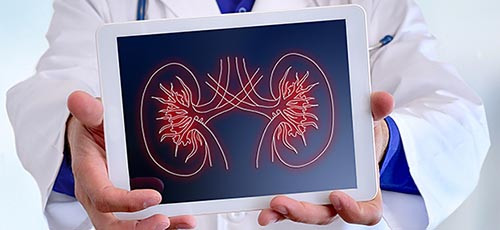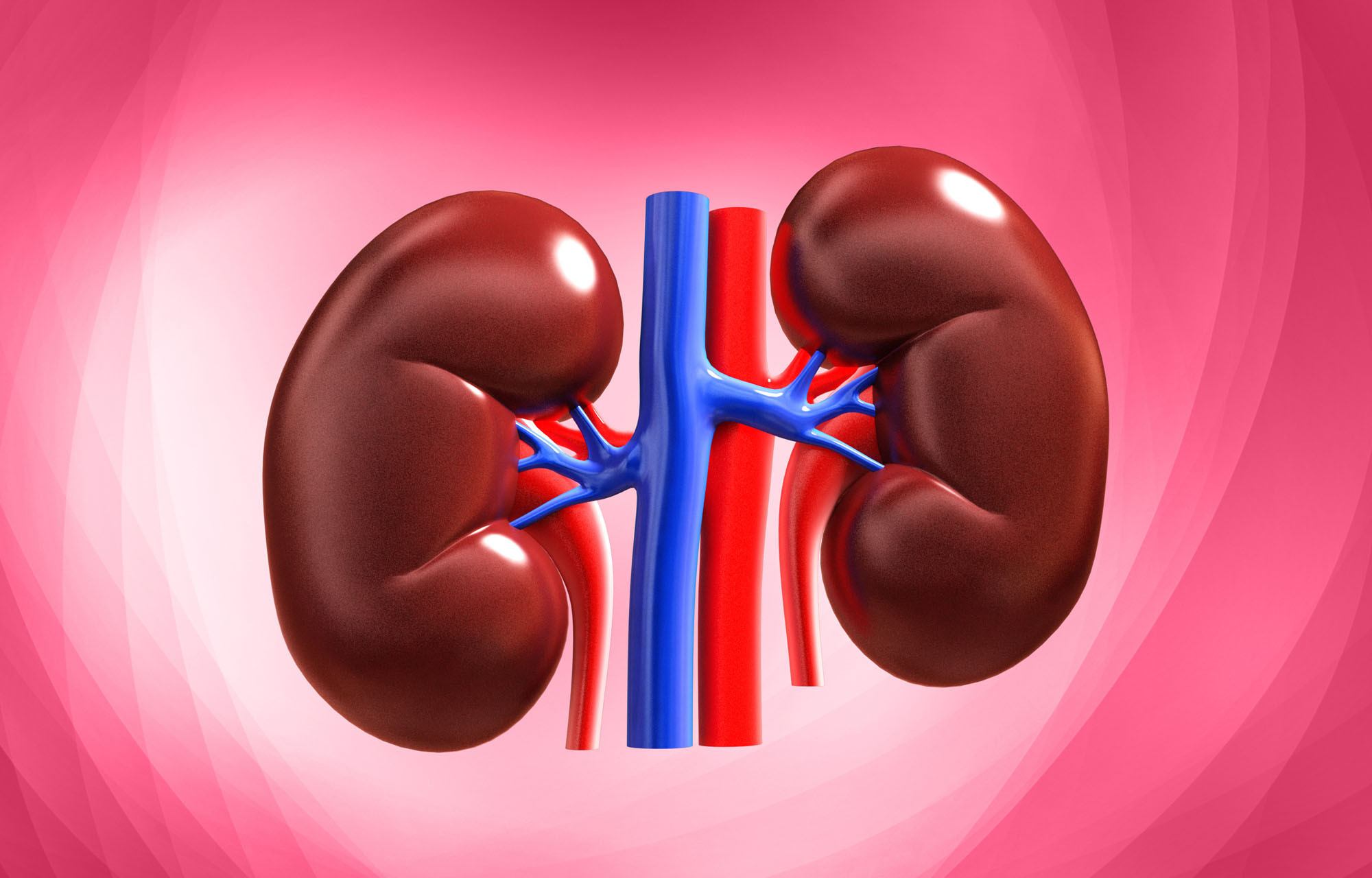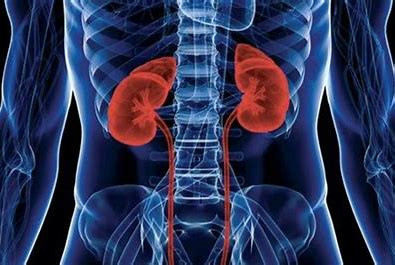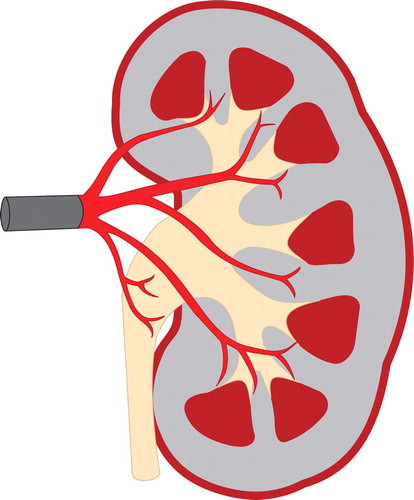Definition
End-stage renal disease (ESRD), also known as stage 5 kidney failure, is characterized by significantly decreased kidney function, with the kidneys operating at less than 10% or permanently losing their effectiveness.
Normally, the kidneys act as a "filter," removing toxins, waste, and unnecessary substances from the body through urine. However, in ESRD patients, the kidneys cannot excrete these substances, leading to their accumulation in the body. Without regular blood cleansing (hemodialysis) or kidney transplantation, this condition can lead to various complications.
Before reaching end-stage kidney failure, patients typically experience a gradual decline in kidney function. This decline is often assessed using the Glomerular Filtration Rate (GFR) formula, measured through blood tests. The stages of kidney function decline are categorized as follows:
- Stage 1: GFR > 90 (kidney function is still normal, but signs of decline appear).
- Stage 2: GFR 60–89 (kidney function declines).
- Stage 3: GFR 30–59 (kidneys become less effective, leading to symptoms).
- Stage 4: GFR 15–29 (severely reduced kidney function).
- Stage 5: GFR < 15 (kidneys are almost non-functional).
ESRD is a significant global public health challenge, affecting approximately 13.4% of the world's population, with a growing mortality rate, particularly in developing countries like Indonesia, due to inadequate access to facilities and treatment for this disease.
Causes
End-stage renal disease (ESRD) is often the result of other conditions or diseases that gradually damage the kidneys over a period of years. Some common causes and contributing factors include:
- Diabetes
- Hypertension or high blood pressure
- Autoimmune diseases, such as lupus and IgA nephropathy, where the body's immune cells attack healthy kidney cells
- Nephrotic syndrome, which causes the kidneys to leak protein into the urine due to their inability to filter it properly
- Kidney stone disease
- Acute kidney failure
- Genetic diseases like polycystic kidney disease, characterized by the growth of cysts in the kidneys
Additionally, inadequate water consumption and excessive intake of medications, herbal remedies, energy drinks, and alcohol can also contribute to the development of end-stage renal disease.
In essence, ESRD occurs when the kidneys lose their ability to filter blood and toxins due to damage to the blood vessels in the kidneys, leading to a lack of oxygen and nutrient supply. This damage can trigger inflammation in the kidneys, resulting in a decline, or even loss, of their ability to filter blood effectively.
Risk factor
Some factors that can increase the risk of end-stage renal disease (ESRD) include:
- History of type 2 diabetes: Type 2 diabetes is a significant risk factor for the decline in kidney function.
- History of high blood pressure: Hypertension is the second most common risk factor for kidney function decline.
- Unhealthy lifestyle: Long-term unhealthy habits like smoking, excessive alcohol consumption, overuse of herbal remedies and pain relievers, and lack of physical activity can increase the risk of ESRD.
- Obesity: Being overweight can strain the kidneys, as they need to work harder to filter unwanted substances.
- Age: Individuals over 60 have a greater risk of developing ESRD.
- Gender: Males generally have a higher risk of developing ESRD.
- Family history of kidney disease: If there's a family history of kidney failure, the individual is at a higher risk of developing end-stage kidney disease.
- Certain medical conditions: Conditions such as HIV/AIDS, lupus, and hepatitis C can significantly increase the risk of developing end-stage kidney disease.
Symptoms
Symptoms that may occur with end-stage renal disease (ESRD) include:
- Fatigue
- Swelling in the neck, shoulders, arms, and legs
- Headaches
- Muscle cramps
- Back pain
- Nausea
- Vomiting
- Shortness of breath
- Minimal or absent urine output
- Changes in skin color (may become darker or lighter)
- Dry and itchy skin
- Loss of appetite
- Difficulty concentrating
- Chest pain
- Difficulty sleeping
Diagnosis
The diagnosis of end-stage renal disease (ESRD) involves assessing symptoms and examination results. The doctor will inquire about the patient's symptoms, medical history, family medical history, and lifestyle habits. Additionally, a physical examination will be conducted, including an inspection of the patient's skin and body, assessment of blood pressure, and respiratory rate, correlating them with symptoms of end-stage kidney disease. To help establish a diagnosis, several diagnostic tests are commonly performed:
- Blood tests assess hemoglobin levels, electrolyte levels, and kidney function by examining the blood's levels of substances such as urea and creatinine. Elevated levels may indicate decreased kidney function.
- Urine tests assess albumin protein levels and look for blood in the urine, which may indicate kidney leakage.
- Imaging examination, imaging techniques such as ultrasonography (USG), CT scan, and MRI may be used to assess the shape, size, and condition of the kidneys, as well as to identify any abnormalities such as cysts or kidney stones.
- Kidney tissue biopsy, In cases where the cause of kidney disease is unclear, a small kidney tissue sample may be examined.
Management
In end-stage renal failure, treatment options typically include dialysis (hemodialysis), kidney transplantation, and palliative care. Since the kidneys are no longer functioning properly, the goal of treatment is to improve the patient's quality of life.
There are no specific medications that can cure kidney disease. However, medications may be prescribed to manage conditions commonly seen in patients, such as anemia, and to control diseases that can accompany ESRD, such as diabetes and hypertension.
Hemodialysis
Hemodialysis is a blood cleansing treatment performed approximately 2 times a week for the rest of the patient's life. It acts as a substitute for the kidneys to filter substances that the damaged kidneys can no longer filter. Consultation with the attending physician is necessary to consider the hospital's availability of facilities and resources for this procedure.
Kidney transplantation
Kidney transplantation involves replacing a kidney with a new one from a living or deceased donor. The donor must have a kidney that is 100% compatible with the patient. If feasible, this procedure may eliminate the need for hemodialysis.
Palliative care
This is performed if the patient does not agree to undergo the above procedures, and end-stage kidney failure cannot be cured except through those procedures. Palliative care, such as emotional, psychological, and spiritual support, can be provided to the patient to alleviate symptoms and maximize the patient's quality of life.
Complications
If ESRD is not well managed, short-term and long-term complications can arise due to the accumulation of toxins in the body. These complications may include:
- Hypertension
- Anemia or a lack of red blood cells
- Heart disease
- Elevated levels of potassium and phosphorus in the body
- Metabolic acidosis (accumulation of acid levels in the body)
- Increased risk of mortality
Prevention
There are several ways to maintain kidney health and prevent end-stage renal disease. These include:
- Regular physical activity and exercise to promote overall health.
- Maintaining normal blood sugar and blood pressure levels
- Maintaining a healthy weight
- Drinking an adequate amount of water daily
- Avoiding smoking
- Undergoing regular kidney function tests to monitor kidney health
- Avoiding the long-term use of pain relievers without a doctor's prescription
When to see a doctor?
Visit a doctor if you experience the symptoms mentioned above, especially if you have a history of diabetes and hypertension. Patients with diabetes and hypertension should undergo regular blood tests to check kidney function.
For patients with end-stage renal failure, discuss the necessary treatment and dialysis schedule with your doctor, as dialysis is a routine and lifelong therapy.
Seek immediate medical attention at the emergency unit if signs of an emergency, such as shortness of breath, swelling in the legs and arms, paleness, and decreased consciousness, are observed.
Looking for more information about other diseases? Click here!
- dr Hanifa Rahma
American Kidney Fund - Stage 5 Chronic Kidney Disease. (2020) Retrieved 19 July 2022, from https://www.kidneyfund.org/all-about-kidneys/stages-kidney-disease/stage-5-chronic-kidney-disease-ckd#toc-5916
John Hopkins Medicine - End Stage Renal Disease. (2020) Retrieved 19 July 2022, from https://www.hopkinsmedicine.org/health/conditions-and-diseases/end-stage-renal-failure
P2PTM Kemenkes RI - Bagaimana mencegah penyakit ginjal kronis? (2021) Retrieved 19 July 2022, from http://p2ptm.kemkes.go.id/infographic-p2ptm/hipertensi-penyakit-jantung-dan-pembuluh-darah/bagaimana-mencegah-penyakit-ginjal-kronis











